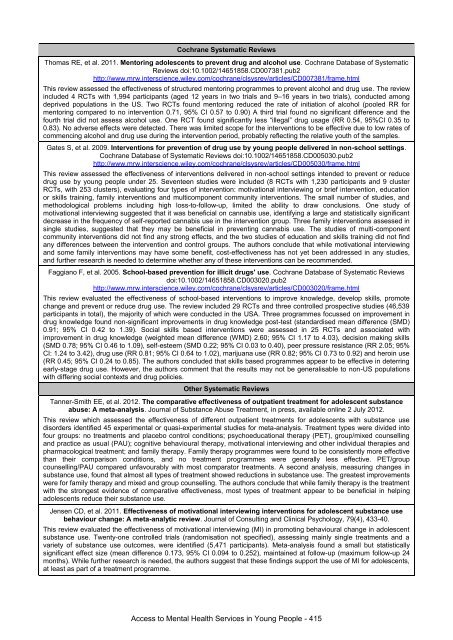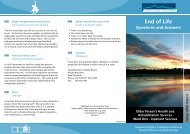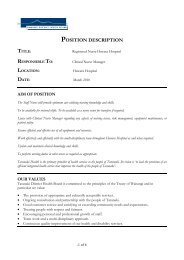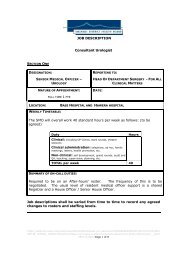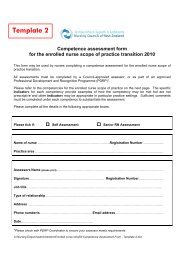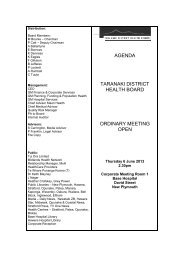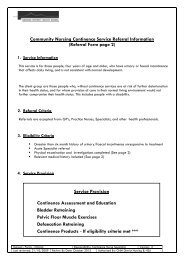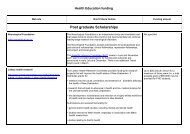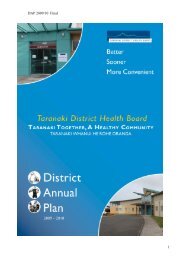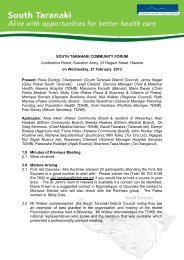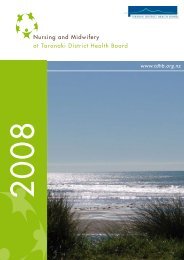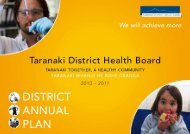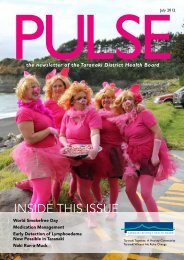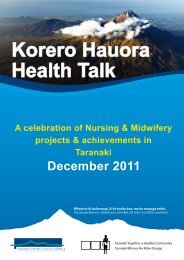This annual report - Taranaki District Health Board
This annual report - Taranaki District Health Board
This annual report - Taranaki District Health Board
- No tags were found...
You also want an ePaper? Increase the reach of your titles
YUMPU automatically turns print PDFs into web optimized ePapers that Google loves.
Cochrane Systematic ReviewsThomas RE, et al. 2011. Mentoring adolescents to prevent drug and alcohol use. Cochrane Database of SystematicReviews doi:10.1002/14651858.CD007381.pub2http://www.mrw.interscience.wiley.com/cochrane/clsysrev/articles/CD007381/frame.html<strong>This</strong> review assessed the effectiveness of structured mentoring programmes to prevent alcohol and drug use. The reviewincluded 4 RCTs with 1,994 participants (aged 12 years in two trials and 9–16 years in two trials), conducted amongdeprived populations in the US. Two RCTs found mentoring reduced the rate of initiation of alcohol (pooled RR formentoring compared to no intervention 0.71, 95% CI 0.57 to 0.90) A third trial found no significant difference and thefourth trial did not assess alcohol use. One RCT found significantly less “illegal” drug usage (RR 0.54, 95%CI 0.35 to0.83). No adverse effects were detected. There was limited scope for the interventions to be effective due to low rates ofcommencing alcohol and drug use during the intervention period, probably reflecting the relative youth of the samples.Gates S, et al. 2009. Interventions for prevention of drug use by young people delivered in non-school settings.Cochrane Database of Systematic Reviews doi:10.1002/14651858.CD005030.pub2http://www.mrw.interscience.wiley.com/cochrane/clsysrev/articles/CD005030/frame.html<strong>This</strong> review assessed the effectiveness of interventions delivered in non-school settings intended to prevent or reducedrug use by young people under 25. Seventeen studies were included (8 RCTs with 1,230 participants and 9 clusterRCTs, with 253 clusters), evaluating four types of intervention: motivational interviewing or brief intervention, educationor skills training, family interventions and multicomponent community interventions. The small number of studies, andmethodological problems including high loss-to-follow-up, limited the ability to draw conclusions. One study ofmotivational interviewing suggested that it was beneficial on cannabis use, identifying a large and statistically significantdecrease in the frequency of self-<strong>report</strong>ed cannabis use in the intervention group. Three family interventions assessed insingle studies, suggested that they may be beneficial in preventing cannabis use. The studies of multi-componentcommunity interventions did not find any strong effects, and the two studies of education and skills training did not findany differences between the intervention and control groups. The authors conclude that while motivational interviewingand some family interventions may have some benefit, cost-effectiveness has not yet been addressed in any studies,and further research is needed to determine whether any of these interventions can be recommended.Faggiano F, et al. 2005. School-based prevention for illicit drugs' use. Cochrane Database of Systematic Reviewsdoi:10.1002/14651858.CD003020.pub2http://www.mrw.interscience.wiley.com/cochrane/clsysrev/articles/CD003020/frame.html<strong>This</strong> review evaluated the effectiveness of school-based interventions to improve knowledge, develop skills, promotechange and prevent or reduce drug use. The review included 29 RCTs and three controlled prospective studies (46,539participants in total), the majority of which were conducted in the USA. Three programmes focussed on improvement indrug knowledge found non-significant improvements in drug knowledge post-test (standardised mean difference (SMD)0.91; 95% CI 0.42 to 1.39). Social skills based interventions were assessed in 25 RCTs and associated withimprovement in drug knowledge (weighted mean difference (WMD) 2.60; 95% CI 1.17 to 4.03), decision making skills(SMD 0.78; 95% CI 0.46 to 1.09), self-esteem (SMD 0.22; 95% CI 0.03 to 0.40), peer pressure resistance (RR 2.05; 95%CI: 1.24 to 3.42), drug use (RR 0.81; 95% CI 0.64 to 1.02), marijuana use (RR 0.82; 95% CI 0.73 to 0.92) and heroin use(RR 0.45; 95% CI 0.24 to 0.85). The authors concluded that skills based programmes appear to be effective in deterringearly-stage drug use. However, the authors comment that the results may not be generalisable to non-US populationswith differing social contexts and drug policies.Other Systematic ReviewsTanner-Smith EE, et al. 2012. The comparative effectiveness of outpatient treatment for adolescent substanceabuse: A meta-analysis. Journal of Substance Abuse Treatment, in press, available online 2 July 2012.<strong>This</strong> review which assessed the effectiveness of different outpatient treatments for adolescents with substance usedisorders identified 45 experimental or quasi-experimental studies for meta-analysis. Treatment types were divided intofour groups: no treatments and placebo control conditions; psychoeducational therapy (PET), group/mixed counsellingand practice as usual (PAU); cognitive behavioural therapy, motivational interviewing and other individual therapies andpharmacological treatment; and family therapy. Family therapy programmes were found to be consistently more effectivethan their comparison conditions, and no treatment programmes were generally less effective. PET/groupcounselling/PAU compared unfavourably with most comparator treatments. A second analysis, measuring changes insubstance use, found that almost all types of treatment showed reductions in substance use. The greatest improvementswere for family therapy and mixed and group counselling. The authors conclude that while family therapy is the treatmentwith the strongest evidence of comparative effectiveness, most types of treatment appear to be beneficial in helpingadolescents reduce their substance use.Jensen CD, et al. 2011. Effectiveness of motivational interviewing interventions for adolescent substance usebehaviour change: A meta-analytic review. Journal of Consulting and Clinical Psychology, 79(4), 433-40.<strong>This</strong> review evaluated the effectiveness of motivational interviewing (MI) in promoting behavioural change in adolescentsubstance use. Twenty-one controlled trials (randomisation not specified), assessing mainly single treatments and avariety of substance use outcomes, were identified (5,471 participants). Meta-analysis found a small but statisticallysignificant effect size (mean difference 0.173, 95% CI 0.094 to 0.252), maintained at follow-up (maximum follow-up 24months). While further research is needed, the authors suggest that these findings support the use of MI for adolescents,at least as part of a treatment programme.Access to Mental <strong>Health</strong> Services in Young People - 415


